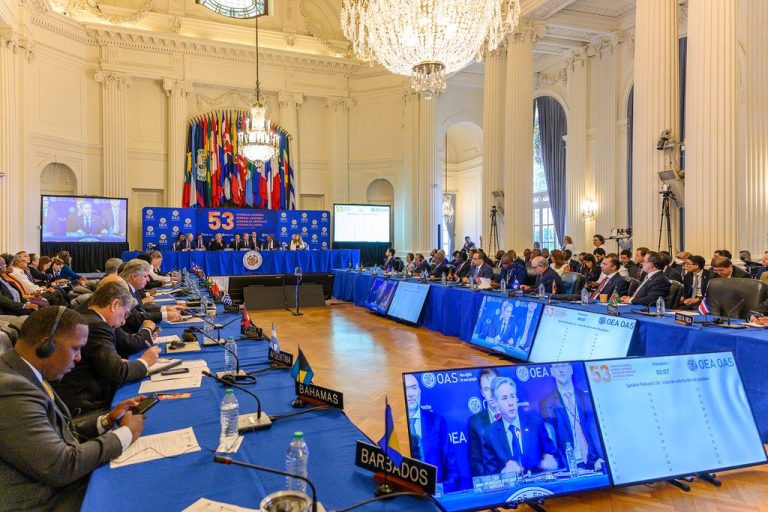28 de junio 2023

Children of Exile: The Births “Sowing Hope” in the Camp of Nicaraguan Farmers

PUBLICIDAD 1M
PUBLICIDAD 4D
PUBLICIDAD 5D
The resolution was unanimously approved at the OAS Assembly of Foreign Ministers, with the exception of a "footnote" requested by El Salvador.

Vista de una sesión de la 53° Asamblea General de cancilleres de la OEA. Foto: Flickr/OEA
Foreign ministers gathered at the 53rd General Assembly of the Organization of American States (OAS) approved by acclamation a resolution condemning the dictatorship of Daniel Ortega and Rosario Murillo in Nicaragua, urging them to "cease all human rights violations and respect the civil, political and religious rights of Nicaraguans."
The resolution, unanimously approved by the 32 representatives of the States present –Nicaragua and Venezuela did not participate-- also calls for an end to the persecution of "journalists, media, civil society organizations and religious communities, respecting the right to freedom of expression and peaceful assembly."
Only the El Salvador delegation requested the addition of a "footnote" stating that it "reaffirms its principled position on international law, in the sense of not intervening or interfering in the internal affairs of another country."
The proposed resolution, entitled "The Human Rights Crisis in Nicaragua", was presented by Canada and went through several revisions by representatives of the member countries. It was a contentious process due to a first attempt by the Brazilian representation to soften the document so that it would not be so critical of the Ortega regime.
The resolution was co-sponsored by the United States, Antigua and Barbuda, Chile and Costa Rica.
This was the last Assembly of Foreign Ministers of the OAS in which Nicaragua is still a member. In November 2021, the dictatorship denounced the Constitutive Charter of the OAS and initiated its exit from the organization in a process that takes two years to enter into effect. Ortega's decision came about because in that Assembly of Foreign Ministers rejected the legitimacy of the presidential elections that reelected Ortega.
The resolution demands that the regime "immediately and unconditionally release all political prisoners, in compliance with the decisions and recommendations of the Inter-American Court of Human Rights and the Inter-American Commission on Human Rights."
It also urges "the Government of Nicaragua to refrain from repressing and arbitrarily detaining leaders of the Catholic Church and to provide information on the physical and psychological health of Bishop Rolando Álvarez, who, according to the information received, is being held in isolation in maximum security facilities."
On Thursday, June 22, Brazilian President Lula Da Silva said in Rome that after meeting with Pope Francis, he will now try to convince Ortega to release Bishop Rolando Álvarez, sentenced to 26 years and four months in prison.
Similar to the current resolution, the resolution of the OAS Assembly of Foreign Ministers in 2022 also unanimously demanded that the dictatorship "immediately release all political prisoners" and "cease the repression and arbitrary detention of the leaders of the Catholic Church."
In the text approved on Friday, June 23, the General Assembly of Foreign Ministers "calls on the member states to do everything possible to encourage the Nicaraguan authorities to engage in dialogue at the highest level."
They further request that "the Permanent Council continue to address the political and human rights situation in Nicaragua, receiving regular updates from the IACHR and other expert bodies, and to consider all additional actions that may be conducive to the effective exercise of representative democracy, the rule of law, and the protection of human rights in the country."
They urge "the Working Group on Nicaragua to make the agenda for any dialogue with the Nicaraguan authorities as broad as possible within the framework of respect for democracy, international law and the principle of non-intervention."
Representatives of the co-sponsoring states –Antigua and Barbuda, Costa Rica, United States and Canada– intervened to speak on the Nicaraguan crisis. Guyana did as well.
The ambassador of Antigua and Barbuda, Ronald Sanders, said he regretted that Nicaragua had responded with "disdain" to the various initiatives of the OAS to promote dialogue and negotiation to resolve the human rights crisis that has prevailed in the country since 2018, and reiterated that this body must insist on seeking a way out of the serious socio-political situation in Nicaragua.
The representative of Costa Rica, Alejandra Solano, emphasized the Ortega dictatorship's non-compliance with the resolutions of the Inter-American Court of Human Rights (IACHR), demanding the release of several political prisoners, and mentioned the persecution against opponents, civil society organizations, and the Catholic Church.
Solano continued: "This political crisis has caused a human drama for many Nicaraguan families. There have been illegal seizures of bank accounts and illegitimate confiscations of private property, including the offices of this organization [OAS] and the expulsion of its staff."
The U.S. Ambassador, Frank Mora, expressed his country's satisfaction with the consensus reached in the OAS "to firmly position itself against the serious human rights abuses of the government of Daniel Ortega in its process of destroying Nicaragua's democracy."
This article was originally published in Spanish in Confidencial and translated by our staff.
PUBLICIDAD 3M
Confidencial es un diario digital nicaragüense, de formato multimedia, fundado por Carlos F. Chamorro en junio de 1996. Inició como un semanario impreso y hoy es un medio de referencia regional con información, análisis, entrevistas, perfiles, reportajes e investigaciones sobre Nicaragua, informando desde el exilio por la persecución política de la dictadura de Daniel Ortega y Rosario Murillo.
PUBLICIDAD 3D